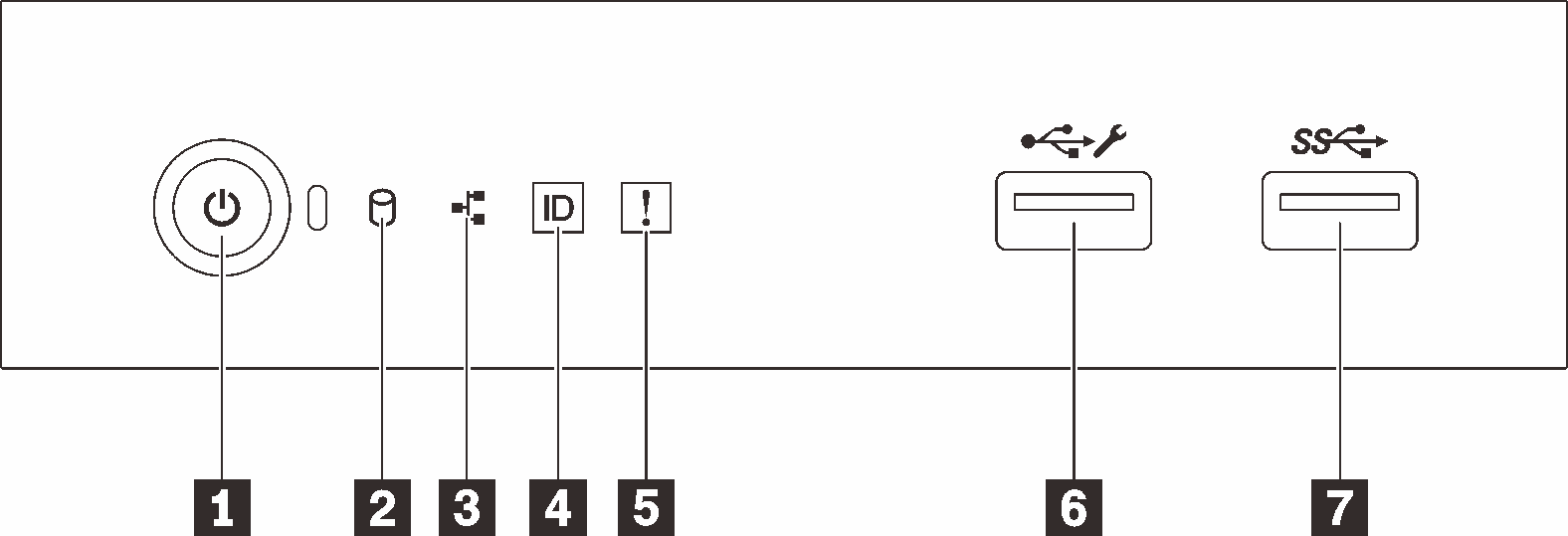Front panel
The front panel of the server provides controls, connectors, and LEDs.

| Callout | Callout |
|---|---|
| 1 Power button with power status LED (green) | 5 System error LED (yellow) |
| 2 Drive activity LED (green) Note For onboard SATA indication only | 6 XClarity Controller USB 2.0 connector |
| 3 Network activity LED (green) Note For onboard LAN indication only | 7 USB 3.2 Gen 1 connector |
| 4 System ID button with system ID LED (blue) |
1 Power button with power status LED
| Status | Color | Description |
|---|---|---|
| Solid on | Green | The server is on and running. |
| Slow blinking (about one flash per second) | Green | The server is off and is ready to be powered on (standby state). |
| Fast blinking (about four flashes per second) | Green | The server is off, but the XClarity Controller is initializing, and the server is not ready to be powered on. |
| Off | None | There is no ac power applied to the server. |
2 Drive activity LED
| Status | Color | Description |
|---|---|---|
| Solid on | Green | The drive is active. |
| Flashing | Green | The drive is being accessed. |
| Off | None | The drive is not active. |
3 Network activity LED
The network activity LED helps you identify the network connectivity and activity.
| Status | Color | Description |
|---|---|---|
| On | Green | The server is connected to a network. |
| Blinking | Green | The network is connected and active. |
| Off | None | The server is disconnected from the network. |
4 System ID button with system ID LED
Use this system ID button and the blue system ID LED to visually locate the server. Each time you press the system ID button, the state of the system ID LED changes. The LED can be changed to on, blinking, or off. You can also use the Lenovo XClarity Controller or a remote management program to change the state of the system ID LED to assist in visually locating the server among other servers.
If the XClarity Controller USB connector is set to have both the USB 2.0 function and XClarity Controller management function, you can press the system ID button for three seconds to switch between the two functions.
5 System error LED
The system error LED provides basic diagnostic functions for your server.
| Status | Color | Description | Action |
|---|---|---|---|
| On | Yellow | An error has been detected on the server. Causes might include one or more of the following errors:
| Check the event log to determine the exact cause of the error. |
| Off | None | The server is off or the server is on and is working correctly. | None. |
6 XClarity Controller USB connector
If the connector is set for USB 2.0 function, you can attach a device that requires a USB 2.0 connection, such as a keyboard, a mouse, or a USB storage device.
If the connector is set for XClarity Controller management function, you can attach a mobile device installed with the application to run XClarity Controller event logs.
If the connector is set to have both functions, you can press the system ID button for three seconds to switch between the two functions.
For more information, see Set front USB port for Lenovo XClarity Controller connection.
7 USB 3.2 Gen 1 connector
Used to attach a device that requires a USB 2.0 or 3.0 connection, such as a keyboard, a mouse, or a USB flash drive.